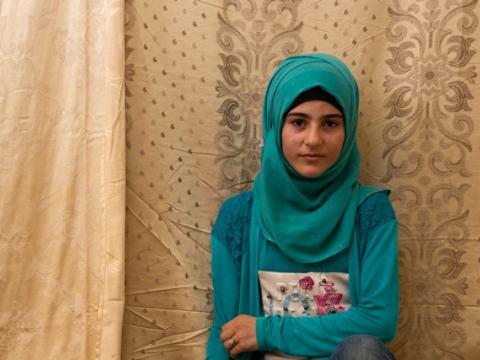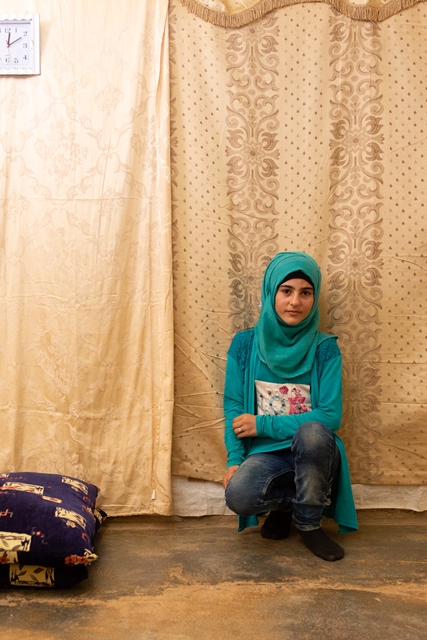A lot like school

“We used to have fun, but the sun was too strong. We also used to see big scary snakes, but they never came close.” With contradiction, Shahed, a 12-year-old Syrian refugee, shares her mixed feelings around working in the fields. She is well aware that she should have been studying like a normal child her age instead of sharing a ride with her neighbors from the nearby tents and heading to one of the many agricultural lands in Bekaa, Lebanon. Speaking paradoxically of the four exhausting hours she spent in the sun is Shahed’s way of saying, “what if I have to go through this again?”
In 2013, Shahed’s parents decided to turn their back on the darkness of Aleppo and save their five children. They headed to Lebanon for a fresh, peaceful start, where their children could have promising futures. They found a home in the Bekaa Valley, similar to many Syrian refugee families; but as the days went by, Shahed’s parents realized that their expectations were far from reality. Instead of pursuing their education, Shahed and her brother did not step a foot in a classroom. “The Lebanese schools did not accept me because I was seven when I came to Lebanon. The principals we met with said that my age would not allow me to keep up with the Lebanese academic programme,” recalls Shahed. The family’s situation worsened when her father had an accident at the construction site where he worked, which resulted in a severe leg injury. He was no longer able to put food on the table. Therefore, Shahed, her brother, and their mother stepped up.
"I've never lived in a tent before i came to Lebanon, and i was never this poor! My life changed drastically," confesses Shahed.
Her mother started cleaning houses for a living, and her brother began working as a mechanic, whereas Shahed collected peach. “It wasn’t that bad. The girls and I laughed a lot. We pretended we were going on trips,” admits Shahed. Back then, she and her friends had nowhere else to go. It was either work or staying inside their tents all day. “Every time I looked at her face, I was able to tell how exhausted she felt,” says Douaa, Shahed’s eldest cousin, “her body was too small to handle all this fatigue!”
With funds from Hong Kong, World Vision started implementing psychosocial support (PSS) sessions in the informal tented settlement (ITS) where Shahed and her friends reside. The PSS helps children affected by conflicts and at risk of child labor. It helps them maintain and develop positive relationships with family and friends through organized entertainment activities; including games and play-based interventions. It provides a safe and stable environment that creates a sense of a normalcy, exactly what Shahed and the other 2560 children in her settlement need.
“All of the children in this settlement looked tired and they were longing for a place where they could simply be silly, play, eat and laugh,” explains Tha’er, one of the teachers in the programme. The teachers met with Shahed and her friends and felt it was time the children got rid of their daily stressors. Tha’er noticed Shahed’s anxiety, asked around and was informed of her father’s condition. “We pay extra attention to children with circumstances similar to Shahed, and bit by bit we saw good results.” Tha’er is well aware that sometimes it is impossible for children to quit work, because the survival of their family members depends on them. “When we can reduce their working hours and contribute to their comfort and happiness, this is proof that we have succeeded,” confirms Tha’er.
Tha'er surrounded by Shahed and her relatives.
“I’ve never lived in a tent before I came to Lebanon, and I was never this poor! My life changed drastically,” confesses Shahed angrily. She explains that the best part about the programme is that she and her friends now gather to play and not work. “We love the idea of being in something that feels a lot like a school,” says Shahed, with signs of melancholy on her face. The glimpse of hope she now has sparks her back to life, “however, I have so much fun at the sessions that I even told my mother I didn’t want to work anymore, and she accepted.” Even though her mother has to work more, she prioritizes her daughter’s happiness.
Shahed is not tired anymore. Neither are her friends. As long as the psychosocial support sessions are there, these children will work less and learn more. They are pleased with any other alternative that feels like a school and helps them see what the future holds instead of what they have lost. The 2560 Syrian children who are at risk of child labor do not complain about the hardships of having a job, because there are no promises that they will not have to go through that again.
We must be their voice and champion to make sure they do not have to.

